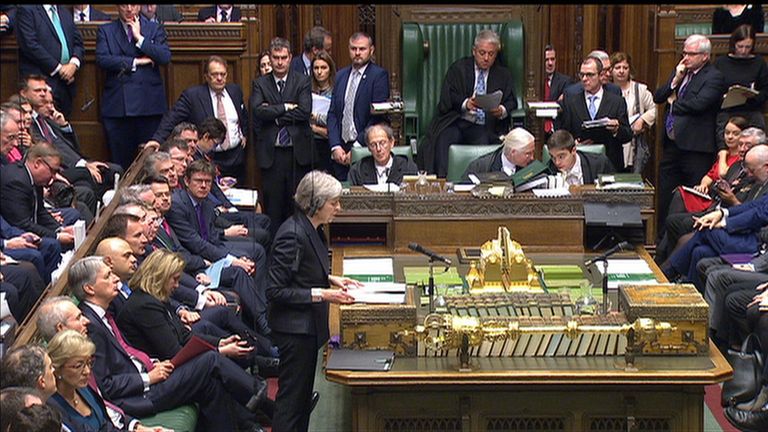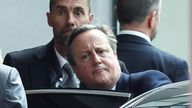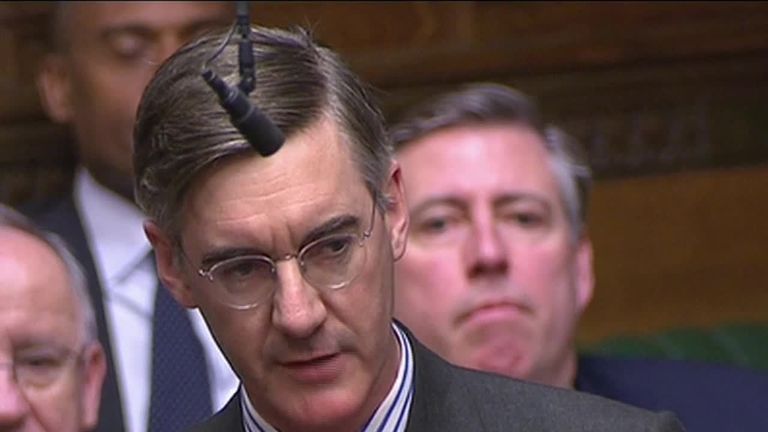Theresa May is the only fan of her own draft Brexit deal
Sky's Lewis Goodall says the PM's endurance is to be admired as she was forced to parry rhetorical hand grenades in the Commons.
Thursday 15 November 2018 19:44, UK
We haven't seen anything like it for a very long time.
There haven't been so many hostile interventions against a sitting prime minister from their own side since Neville Chamberlain's Norway debate in 1940.
Chamberlain resigned shortly afterwards.
:: LIVE: PM fights for survival amid Brexiteer backlash
You had to admire the PM's endurance during questions in the Commons. She was forced to parry rhetorical hand grenades from every side of the House.
Jacob Rees-Mogg, the prominent Brexiteer, even asked her directly why he should resist calling for a vote of no confidence in her leadership.
After an hour of debate not a single MP had spoken in favour of the deal.
At times it seemed it had but a single MP speaking in its favour - the prime minister herself.
Arguably, the Commons showdown was an indictment of her Brexit strategy.
Theresa May, perhaps understandably and rightly, attempted to chart a middle course between the Brexit armies.
She has devised a solution which has come to be seen as neither the hard Brexit that her most die hard backbenchers desired (and which they say, the prime minister led them to believe she would provide) nor the softest Brexit (or no Brexit) which Remainers crave.
The PM's gamble was that that middle course would please no one entirely but satisfy the requisite number of MPs just enough.
She also assumed that the momentum of finally reaching a deal would eliminate resistance.
The resignations of Dominic Raab and Esther McVey (with perhaps more to come) restricted that momentum. The House felt like a balloon without air.
It is now clear that dozens of Tory MPs will not support the deal.
It is also clear that she may face a leadership challenge.
Talking to Tory strategists and MPs who support the prime minister, they think their only hope is to convince Labour backbenchers in Brexit voting constituencies to support the deal.
One source remarked that many of those MPs, disliked by their local pro-Corbyn members, face deselection anyway and would not want to provoke the chaos of a no deal which would hurt their constituents.
If that is their strategy, it is a highly problematic one.
There are some Labour MPs who have hinted they might support the deal.
But if you imagine Labour MPs as a Venn diagram, separated into two circles between those in heavily Brexit supporting constituencies and those who have given up any future in the Labour party, the shared middle section is not as populated as Number 10 might like.
The prospect of going back to their local parties, explaining that they not only facilitated Brexit but saved a Tory government and prime minister and nullified any real prospect of a general election until 2022 will not be an appealing one.
In any case, by my reckoning the PM is at least 30-40 votes short. There aren't that many Labour MPs swimming in that particular pond.
Mrs May tried to chart a middle course, boxed in by her own early Brexit decisions.
The result was today - the most extraordinary Commons statement for decades.
When she looked over to the Labour benches, on which she still rests her hopes, she might have seen the ghost of a Labour politician long dead, Aneurin Bevan.
His wisdom rings down the ages: "We know what happens to those who stay in the middle of the road - they get run over."





